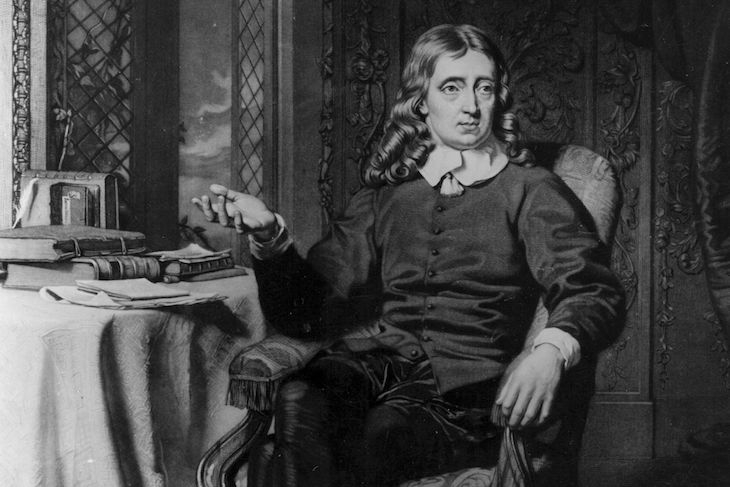It’s a tough listen, Paradise Lost on Radio 4 at the weekend. In bold defiance of the demands of a broad audience, Milton’s 10,000 lines of high-flown, complex verse runs for two-and-a-half hours (broadcast in two parts on Saturday and Sunday). You need to concentrate and take in every word, not be busy with something else, ears half-cocked to gather the general meaning. But, if you stay with it, the majesty of the subject, that galactic struggle between good and evil, and the mighty flow of words will ensure that all foolish thought is thenceforth banished (at least until the next Trumpian tweet or fallacious Facebook rumour).
The poet Michael Symmons Roberts, who has shaped the epic poem for radio, juxtaposes Milton’s verses, set in the cosmic world of God, Satan, Raphael and Beelzebub, with the blind poet’s efforts to wrestle them from his imagination and on to the page. The battle of the angels is brought down to human level by the pathos of Milton’s situation in 1667, shuffling feet, blind man’s stick, the way in which without sight he is forced to live inside his head, brooding on the chaos he has witnessed through the years of the Civil War.
His mythic tale about our loss of innocence in a universe controlled by God but embattled by sin might seem to have little connection with 2018. The language is cloaked in religious assumptions; the imagery straight out of medieval monster tales. And yet as I listened it did feel very much in tune with our own obsessive fears, not just of violent war and insidious temptation, but also of a Manichaean otherworld lying just beyond our cognisance.
Ian McKellen, who voices Milton, has said after recording the production, ‘Being written by a blind man, Paradise Lost has special relevance for a radio audience, as it is all in the sound of the words, not in the look of the words on the page.’ His vocal range and gravitas certainly pay homage to Milton’s muscular rhythms, wrestling every ounce of meaning out of lines like ‘The mind is its own place, and in itself/ Can make a heaven of hell, a hell of heaven’, and ‘What reinforcement we may gain from hope,/ If not, what resolution from despair.’
His Satan is played by Simon Russell Beale, the two theatrical titans battling it out on the airwaves in an epic exhibition of vocal artistry. ‘Poor fools!’ sizzles Russell Beale as he glares down enviously at Adam and Eve in Paradise while plotting his next move.
The Art of Now: Guantanamo, also on Radio 4 (produced by Sarah Geis), was given heightened meaning after absorbing Milton’s vision of our fall from grace. ‘I had a number,’ said Mansoor al-Dayfi. ‘I still have a number, four four one.’ He’s 35 years old and from Yemen, and he spent 14 years, five months and one day imprisoned at the US detention centre at Guantanamo Bay in Cuba. He’s now been released but was never charged. ‘These are facts.’
Mansoor told us how to begin with he and hundreds of his fellow inmates used to make ink out of powdered tea and, using a pen fashioned from a stick, they would draw their children on toilet paper so that ‘they could look at them’. Eventually, they were given art classes (used as an opportunity for control since only those who were compliant were allowed to join in) and an exhibition of their work has now been held at John Jay College in New York, very close to the site of 9/11. But the show was controversial, the Pentagon wanting to destroy all the art created at Guantanamo.
Only a handful of the inmates have ever been charged, and most of those charges have been overturned on appeal, said one of their American lawyers. Their pictures show the Statue of Liberty, flowers, boats, and, very often, the sea. ‘The sea was there,’ Mansoor said. ‘We could hear it. We could smell it. But we couldn’t see it.’
This year’s Good Friday Meditation on Radio 4 (produced by Rosie Dawson) was led by the Revd Mike Long, whose Methodist church in Notting Hill stands close by Grenfell Tower. He talks to Jackie Blanchflower, also a local pastor, whose home overlooked the burning tower and overnight became a refuge, about the need to lament and what that means to the process of grief, remembering the lamentations of the women who stayed by Jesus Christ during the Crucifixion, watching and waiting. He also meets the rabbi of the local Jewish community whose Jewish tradition of ritual grieving, of lamenting, recognises the need to ask that question, ‘How can the world be such as this could happen?’
The wails, the angry cries help to validate the experience, says the rabbi, to acknowledge our loss and our fragility; that something in the fabric of the universe has been destroyed. It recognises that insuch outpourings of grief we are not just isolated individuals but part of something bigger, of an experience beyond ourselves. The lamentation becomes more than just a venting of emotion; it acknowledges pain, but also, in its raw openness, its recognition of vulnerability, it lets something else in.






Comments